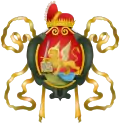Dogado
The Dogado or Duchy of Venice was the homeland of the Republic of Venice, headed by the Doge. It comprised the city of Venice and the narrow coastal strip from Loreo to Grado, though these borders later extended from Goro to the south, Polesine and Padovano to the west, Trevisano and Friuli to the north and the mouth of the Isonzo to the east.
| Duchy of Venice Dogado (vec) | |||||||||
|---|---|---|---|---|---|---|---|---|---|
| Domain of the Republic of Venice | |||||||||
| 697–1797 | |||||||||
 The Venetian Lagoon, with Mestre marked on the mainland, then (north to south) Murano, Venice and the Lido in the lagoon | |||||||||
| Historical era | Middle Ages | ||||||||
• Traditional date of establishment | 697 | ||||||||
• Treaty of Campo Formio | 17 October 1797 1797 | ||||||||
| |||||||||
| Today part of | |||||||||
Apart from Venice, the capital and in practice a city-state of its own, the administration of the Dogado was subdivided in nine districts starting at the north: Grado, Caorle, Torcello, Murano, Malamocco, Chioggia, Loreo, Cavarzere and Gambarare (in Mira). In lieu of the earlier tribunes (elected by the people) and gastalds (corresponding with the Doge), during the Republic each district was led by a patrician with the title of podestà, with the exception of Grado, headed by a Count.
It was one of the three subdivisions of the Republic's possessions, the other two being the Stato da Màr ("Sea State") and the Domini di Terraferma ("mainland domains").
Dogado was the equivalent of Ducato (duchy), the Italian city states that (unlike Venice) had a duke as hereditary head of state.
Bibliography
- Da Mosto, Andrea: L'Archivio di Stato di Venezia, Biblioteca d'Arte editrice, Roma, 1937.
- Mutinelli, Fabio: Lessico Veneto, tipografia Giambattista Andreola, Venezia, 1852.
